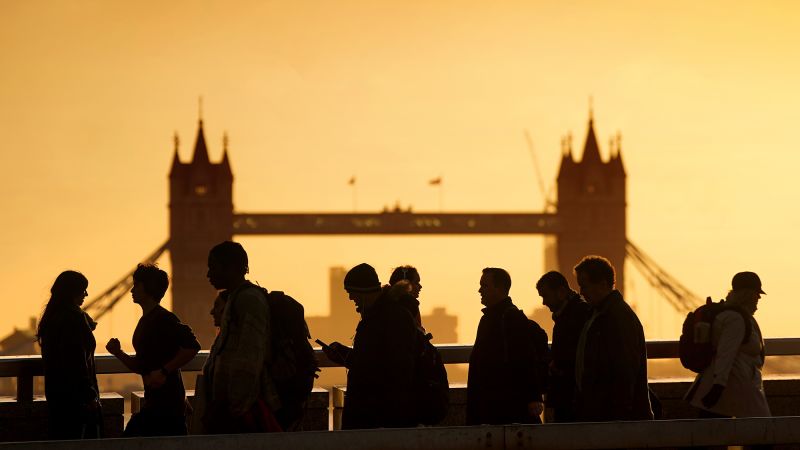Victoria Jones/PA Images/Getty Images
Commuters on London Bridge in January 2024.
London
CNN
—
UK finance minister Jeremy Hunt is set to announce tax cuts for Labor on Wednesday. He is releasing what will be the government's last budget before the general election later this year.
A cut in National Insurance – a tax paid by working people – will cost around £10 billion ($12.7 billion), according to multiple UK media reports. But rising government debt, crumbling public services and a sluggish economy leave little room for the chancellor to make more substantial payments.
The UK economy barely grew in 2023. Slipping into recession Quite the opposite at the end of the year Prime Minister Rishi Sunak pledges to create economic growth. In 2024, the Bank of England sees output expanding by just 0.25%, while the International Monetary Fund forecasts growth of 0.6%.
Despite that bleak backdrop, Hunt is expected to deliver an upbeat assessment of Britain's economic prospects.
“We can now help families with permanent cuts in taxation,” he said According to the Treasury's statement, it should be said. “Conservatives know that lower taxes mean more growth. And more growth means more opportunity and more prosperity.
Hunt's Conservatives are trailing the opposition Labor Party by a wide margin Polls put him under heavy pressure to roll out tax cuts — however small — in a last-ditch effort to win over voters.
Check out this interactive content on CNN.com
But modest cuts in income or payroll taxes are unlikely to change the fact that Britain's overall tax burden remains flat. Post-war high And the standard of living has declined. Economic output per person Still lower than at the end of 2019, not fully recovered From the sharp decline during epidemics, step Office for National Statistics.
Meanwhile, the UK Government debt It has risen more than 40% since 2020 as the government spent heavily on improving households and businesses from the impact of Covid-19 lockdowns and rising energy costs following Russia's full-scale invasion of Ukraine.
At the end of January, public sector debt exceeded £2.6 trillion ($3.3 trillion), according to the ONS, a level not seen since the early 1960s and about the same level as the country's annual gross domestic product. Elevated interest rates compound the pain.
Check out this interactive content on CNN.com
A mounting debt pile is siphoning more money from core public services already squeezed by inflation and past budget cuts.
A number of local authorities have recently declared themselves insolvent – including Britain's second largest city, Birmingham, on Tuesday approved plans to cut local services and dim street lights as it tries to balance the books. The Local Government Association warned in December that councils in England face a funding gap of 4 billion pounds ($5.1 billion) this year and next.
Other “unprotected” areas of the nation The budget is also at risk, as are Social Security and the police force. Spending on defence, schools, the National Health Service and foreign aid have been curbed for now.
Hannah McKay/Reuters
UK Finance Minister Jeremy Hunt poses with a red budget box outside his office in Downing Street on March 6, 2024 in London.
The government's current plans for public spending are “unbelievable,” economists at Capital Economics wrote in a note last month.
“That seems unlikely when public services are creaking,” they added. “Whoever wins the election will have to agree on both taxes and spending.”
Capital economics is not alone in suggesting that the government has played fast and loose when it comes to its spending plans. Its own fiscal watchdog, the Office for Budget Responsibility, recently made a similar point.
OBR Chairman Richard Hughes said In January the government did not provide any detailed details of departmental spending plans beyond March next year, only headline figures.
“Some have referred to it as a work of fiction,” Hughes said.
“It's probably generous that someone has bothered to write a work of fiction, whereas the government hasn't bothered to write their departmental spending plans based on their plans for public services,” he added.
Reducing future spending on public services to pay for tax cuts may backfire now. A survey of almost 2,000 British adults by Deltapol and the Tony Blair Institute last month found that 52% said the government should invest more of its money in improving the quality and efficiency of public services. Only 11% thought the money should be used to cut taxes.
Hunt will make his budget announcement in Parliament from 7:30am.

